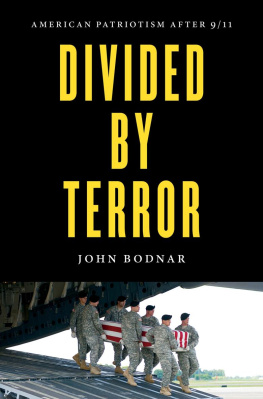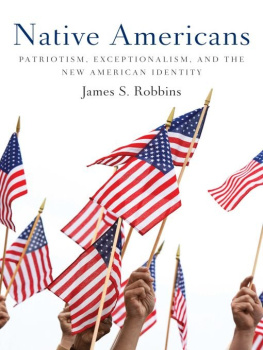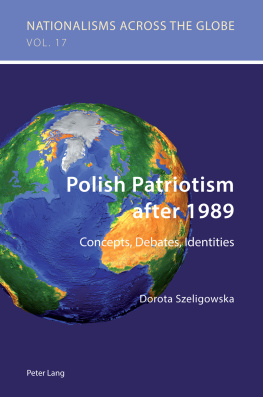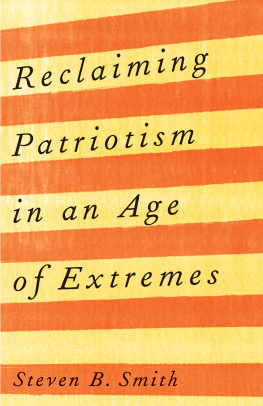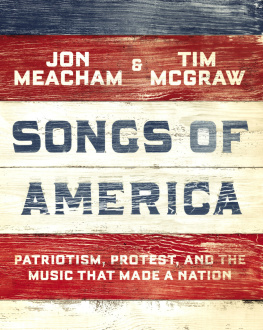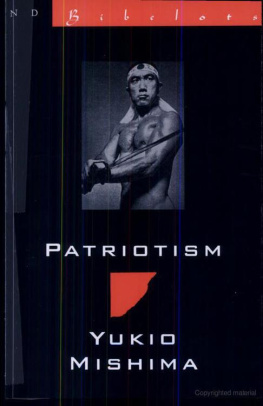This book was published with the assistance of the William R. Kenan Jr. Fund of the University of North Carolina Press.
2021 The University of North Carolina Press
All rights reserved
Set in Charis by Westchester Publishing Services
Manufactured in the United States of America
The University of North Carolina Press has been a member of the Green Press Initiative since 2003.
Library of Congress Cataloging-in-Publication Data
Names: Bodnar, John E., 1944 author.
Title: Divided by terror : American patriotism after 9/11 / John Bodnar.
Description: Chapel Hill : University of North Carolina Press, [2021] | Includes bibliographical references and index.
Identifiers: LCCN 2020044271 | ISBN 9781469662619 (cloth) | ISBN 9781469662626 (ebook)
Subjects: LCSH: September 11 Terrorist Attacks, 2001Social aspects. | PatriotismUnited StatesHistory21st century. | War on Terrorism, 20012009. | War and societyUnited States.
Classification: LCC HV6432.7 .B625 2021 | DDC 973.931dc23
LC record available at https://lccn.loc.gov/2020044271
Jacket illustration: Army Honor Guardsmen during a dignified transfer of a fallen soldier, Dover Air Force Base, Delaware, July 8, 2009. U.S. Department of Defense, http://www.defense.gov/observe/photo-gallery/igphoto/2001154180. The appearance of U.S. Department of Defense (DoD) visual information does not imply or constitute DoD endorsement.
Introduction
The Patriots Debate
As the Twin Towers smoldered and family and friends desperately sought news of loved ones on the morning of September 11, 2001, millions of American citizens rallied to the flag in a patriotic wave that swept the nation. Many vowed to unleash a reign of terror on those responsible for the carnage and destruction. Yet, countless other Americans were reluctant to use the 9/11 assaults as a basis for a worldwide war and recoiled from its implications, choosing instead to bear witness to the death and suffering it brought. Both sides of this divide identified as loyal, patriotic Americans doing what they felt best honored their country and the citizens it lost that day. This dispute, fundamentally about the meaning of patriotism, its ideals, and how to exercise it especially when the nation is threatened, is not new. It has informed politics, citizenship, and Americas sense of inclusion and exclusion for centuries, perhaps most dramatically during wartime. But in the dawn of the twenty-first century, with a legacy of heroic wars followed by the quagmire that was Vietnam, the 9/11 attacks forced Americans to reckon with the bloodshed in their backyard that took them by complete surprise. Emotions ran amok as people attempted to make sense of the assaults and ensure that they never happened again. Divided by Terror provides a lens into this unsettled time and the turbulent debate over patriotism that ensued from the shock of 9/11. Traumatized and angry, the Americans profiled in this book articulated their feelings in countless ways, including patriotic rhetoric, personal memoirs, mourning practices, commemorative memorials, angry reprisals, online postings, works of art, and film. Visions of a military victory over global terrorism competed for attention with serious doubts over the nations rush to battle. Ultimately the book argues that at the beginning of a new century Americans became more divided than united over a war on terror and even over the idea of patriotism itself.
Of course, political leaders were never far from the patriots debate: harnessing, manipulating, and vying for the allegiance of their constituents. George W. Bush recognized that al-Qaeda, the terrorist group that launched the spectacular attack on the nation, was a dangerous adversary. Fueled by a deep sense of hatred over the presence of American forces in Muslim lands such as Saudi Arabia and a visceral hatred of Jews and American support for Israel, the Islamist terror organization caused Bush to realize not only that the nation might be in danger of more assaults but that its influence in the oil-rich Middle East was in jeopardy. He immediately declared a global war. To Bush and his vice president, Dick Cheney, the United States now entered a conflict of cataclysmic proportions in which the threat to the nation and its hegemony in the Middle East was so profound that aggressive tactics had to be implemented at once. In short order the administration began a hunt for enemies by capturing terrorist suspects, launched military attacks abroad, and empowered federal law enforcement agencies to round up immigrants in the homeland.
For Bush and many Americans, war was the only strategy to pursue in light of 9/11: crush the enemy and also remind would-be enemies that American military force reigned supreme and existed to ensure the supremacy of the nation, its ideals, and its people. Not everyone agreed with the president, however, with critics questioning his very terminology, arguing that terrorism was too elusive a term to serve as a descriptor of a war. The point was that since terrorism could erupt at any time or in any place in the future, a battle against it would lead to a forever war with no end in sight. Barack Obama actually dropped the designation of the conflict as a war against terrorism in 2009 when he said we were not fighting a tactic but specific networks of enemies who sought to harm America. In time, Bushs forceful moves would provoke a much more powerful response, however, than a contest over nomenclature or wartime objectives. His global war would actually precipitate a massive domestic quarrel grounded not only in political issues but in deeply personal matters and private emotions that have yet to be fully captured or understood. Millions of citizens would tap their patriotic instincts to support the idea of a war against evil in the world, but many equally patriotic Americans would question vehemently the premise that a War on Terror was even justified. Ultimately the conflict would become a fight not simply over naming rights or threats to the nation but over how the encounter with terrorism should be understood.
Patriotism was central to this intense discussion because it offered a framework in which people could imagine their relationship to the nation to which they belonged and that was now under attack. In 2002 President Bush even declared that September 11th would henceforth be known as Patriot Day, a time in which the heroic sacrifices of first responders and the nations soldiers would be commemorated in order to inspire others. Patriotic myths and rituals have always been important during episodes of state-sponsored violence because of the cognitive power they possess to help shape feelings and beliefs. They can rally populations to a cause and transform the horrors of warfare into mythical tales of valor and heroism. The language of patriotism can serve as a cleansing agent capable of wiping away or justifying, at least on the surface, the cruel realities of death, trauma, sorrow, and, less understood, the utter sense of confusion over what is taking place. Patriotic symbols and narratives have the ability to turn tales of vengeance into love stories and family tragedies into chronicles of exemplary service, renovations necessary to retain allegiances in difficult times.

